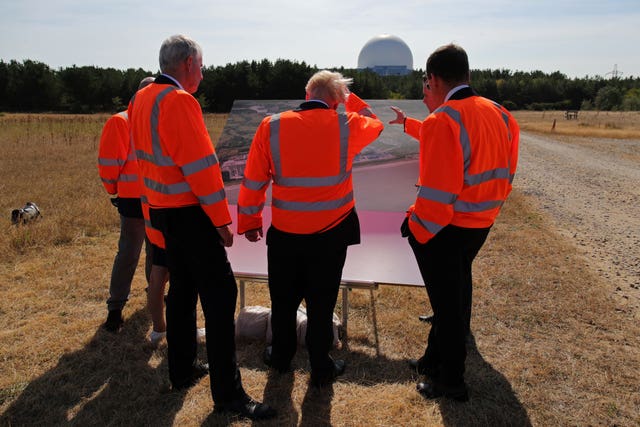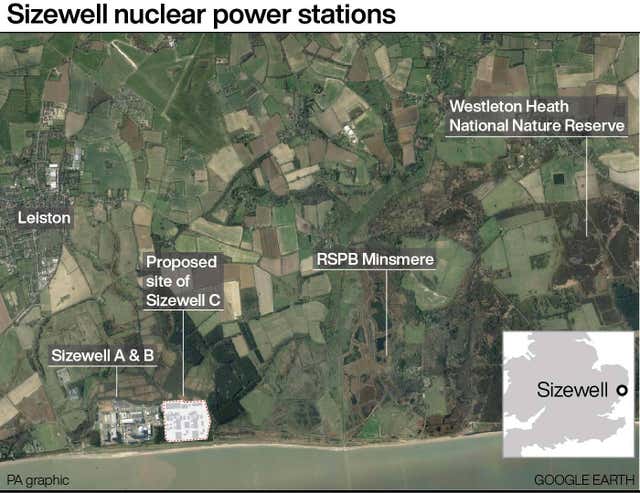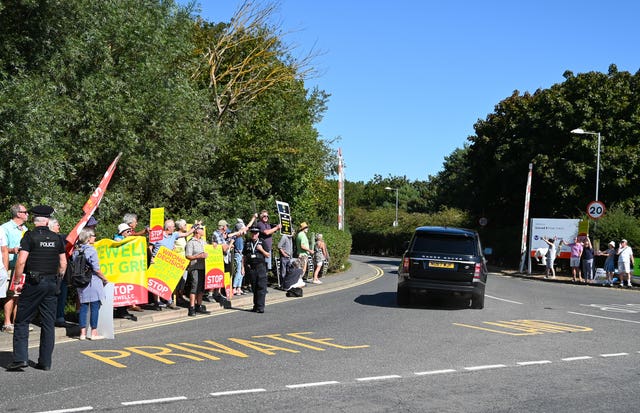Boris Johnson promised £700 million of taxpayers’ money to the Sizewell C nuclear power project as he sought to make energy security part of his legacy as Prime Minister.
In his final policy speech before leaving office, Mr Johnson hit out at successive administrations’ “paralysis” over nuclear power and pledged the funding as part of a bid to move the Suffolk scheme forwards.
The new reactor at Sizewell is expected to be built by energy firm EDF though talks over funding continue.
Mr Johnson leaves office on Tuesday but said he is confident the deal will get “over the line” in the coming weeks.
“We need to pull our national finger out and get on with Sizewell C,” he said.
“That’s why we’re putting £700 million into the deal, just part of the £1.7 billion of Government funding available for developing a large-scale nuclear project to final investment stage – FID (final investment decision) – in this Parliament.
“In the course of the next few weeks, I am absolutely confident that it will get over the line.”
Mr Johnson said it would be “madness” not to go ahead with the project, which would “fix the energy needs, not just of this generation but of the next”.

Mr Johnson will hand power to either Liz Truss or Rishi Sunak following the Tory leadership contest.
He said: “I say to you, with the prophetic candour and clarity of one who is about to hand over the torch of office, I say go nuclear and go large and go with Sizewell C.”
Downing Street was unable to give further details about the funding announcement and EDF has not yet responded, with negotiations over the final arrangements for the project continuing.
The total cost of the Sizewell C project could be around £20 billion, according to reports.
It is not expected to begin generating electricity until the 2030s; the similar reactor at Hinkley Point C in Somerset began construction in 2016 and will not be online until 2027, although this is partly due to the impact of the pandemic.

Mr Johnson, in a speech at Sizewell, said there had been a “paralysis over British nuclear energy”, blaming successive governments for failing to invest in new reactors.
“Yes, nuclear always looks – when you begin – it always looks relatively expensive to build and to run,” he said.
“But look at what’s happening today, look at the results of (Russian President Vladimir) Putin’s war (on Ukraine).
“It is certainly cheap by comparison with hydrocarbons today.”
If Hinkley Point C was operating now, “it would be cutting our national fuel bills by £3 billion”, Mr Johnson said.
Tom Greatrex, chief executive of the Nuclear Industry Association, said: “This announcement is another important step toward starting construction at Sizewell C, cutting gas, cutting bills and creating stable, secure well-paid jobs for people up and down the country.”
GMB union national secretary Andy Prendergast said the funding for Sizewell C is a “belated step in the right direction” but “years of political failure to make the right decision on new nuclear means we are woefully unprepared for the energy crisis facing us today”.
Protesters gathered outside Sizewell as Mr Johnson spoke and the Together Against Sizewell C (TASC) group launched legal proceedings over the Government’s decision to give the project the green light despite concerns from planning inspectors.
Solicitor Rowan Smith, from law firm Leigh Day, said: “For such a locally and nationally important issue, it was vital that the Secretary of State properly assesses the environmental impacts of the project.
“However, TASC believes that fundamental legal errors were made, particularly in respect of water, alternatives to nuclear power, local wildlife and climate change.

“We hope these arguments will now be fully scrutinised by the court.”
Greenpeace UK’s chief scientist Doug Parr said the money announced for Sizewell C “could insulate huge numbers of draughty homes and cut next year’s bills, instead of being thrown on to the slow-burning financial bonfire that is EDF to increase our bills for decades”.
Mr Johnson also highlighted the importance of offshore wind and appeared to take aim at supporters of fracking – such as Ms Truss.
He said: “I tell everybody who thinks ‘hydrocarbons are the only answer, we should get fracking’ and all that, offshore wind is now the cheapest form of electricity in this country.
“Offshore wind is nine times cheaper than gas.”




Why are you making commenting on The National only available to subscribers?
We know there are thousands of National readers who want to debate, argue and go back and forth in the comments section of our stories. We’ve got the most informed readers in Scotland, asking each other the big questions about the future of our country.
Unfortunately, though, these important debates are being spoiled by a vocal minority of trolls who aren’t really interested in the issues, try to derail the conversations, register under fake names, and post vile abuse.
So that’s why we’ve decided to make the ability to comment only available to our paying subscribers. That way, all the trolls who post abuse on our website will have to pay if they want to join the debate – and risk a permanent ban from the account that they subscribe with.
The conversation will go back to what it should be about – people who care passionately about the issues, but disagree constructively on what we should do about them. Let’s get that debate started!
Callum Baird, Editor of The National
Comments: Our rules
We want our comments to be a lively and valuable part of our community - a place where readers can debate and engage with the most important local issues. The ability to comment on our stories is a privilege, not a right, however, and that privilege may be withdrawn if it is abused or misused.
Please report any comments that break our rules.
Read the rules hereLast Updated:
Report this comment Cancel